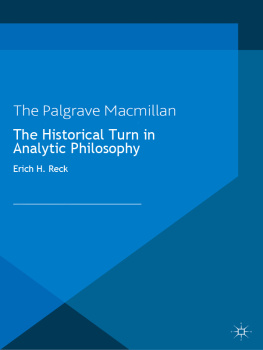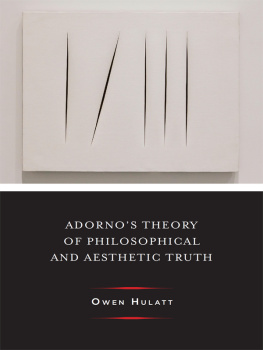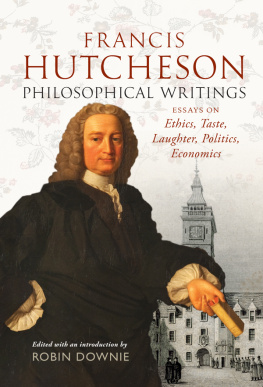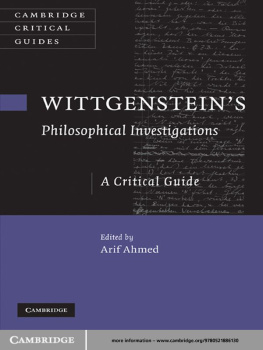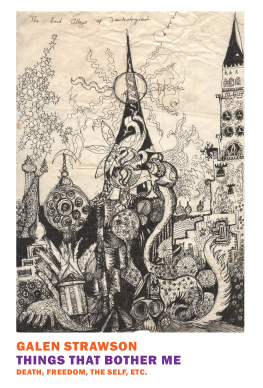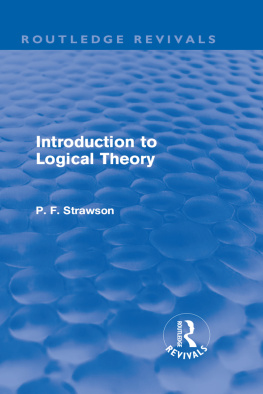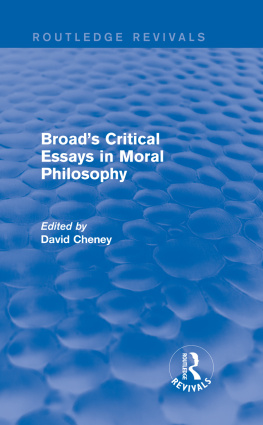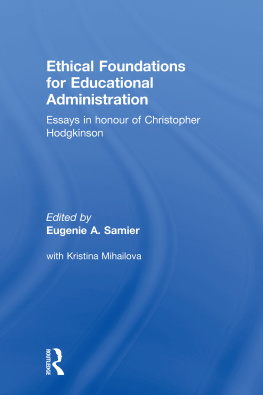Philosophical Writings
P. F. Strawson
(p.iv) 
- Great Clarendon Street, Oxford OX2 6DP
- Oxford University Press is a department of the University of Oxford.
- It furthers the University's objective of excellence in research, scholarship,
- and education by publishing worldwide in
- AucklandCape TownDar es SalaamHong KongKarachi
- Kuala LumpurMadridMelbourneMexico CityNairobi
- New DelhiShanghaiTaipeiToronto
- ArgentinaAustriaBrazilChileCzech RepublicFranceGreece
- GuatemalaHungaryItalyJapanPolandPortugalSingapore
- South KoreaSwitzerlandThailandTurkeyUkraineVietnam
- Oxford is a registered trade mark of Oxford University Press
- in the UK and in certain other countries
- Published in the United States
- by Oxford University Press Inc., New York
- in this volume the Estate of P. F. Strawson 2011
- The moral rights of the author have been asserted
- Database right Oxford University Press (maker)
- All rights reserved. No part of this publication may be reproduced,
- stored in a retrieval system, or transmitted, in any form or by any means,
- without the prior permission in writing of Oxford University Press,
- or as expressly permitted by law, or under terms agreed with the appropriate
- reprographics rights organization. Enquiries concerning reproduction
- outside the scope of the above should be sent to the Rights Department,
- Oxford University Press, at the address above
- You must not circulate this book in any other binding or cover
- and you must impose this same condition on any acquirer
- British Library Cataloguing in Publication Data
- Library of Congress Cataloging in Publication Data
- Typeset by SPI Publisher Services, Pondicherry, India
- Printed in Great Britain
- on acid-free paper by MPG Books Group, Bodmin and King's Lynn
(p.v) Preface
Galen Strawson
During his life my father P. F. Strawson published three collections of papers. Logico-Linguistic Papersappeared in 1971, Freedom and Resentment in 1974, and Entity and Identity in 1997. They contained all the papers he wished to republish up until that time. They omitted one famous piece, In Defence of a Dogma, co-authored or rather co-thought with Paul Grice (Strawson did the writing), and a considerable number of other papers on which, for one reason or another, Strawson did not wish to confer the double imprimatur of republication in a volume of which he was sole author.
In the case of some of the papers, no doubt, this was because he felt that the subjects they treated of had been sufficiently covered, or better covered, in other work by himself. He may, for example, have felt that Proper Names (1957) was superseded by what he had to say on that subject in his book Individuals: An Essay in Descriptive Metaphysics (1959); I found the offprint of Proper Names in an envelope marked papers not worth reprinting. In the case of others, it was because he thought they were too slight, or not sufficiently self-standing, too geared to the particular occasion for which they were written. There were also some he thought inadequate, in one way or another. I believe that Ethical Intuitionism (Philosophy, 1949) falls into this category. He thought his early paper Necessary Propositions and Entailment Statements (Mind, 1948) plain wrong, and it is not reprinted here. Nor was he fully satisfied with his last published paper, A Category of Particulars.
In making the present selection I have followed the extremely helpful advice of the three anonymous Oxford University Press advisers, and Peter Momtchiloff, philosophy editor at the Press. I have included all those papers whose republication they recommended, including some that I was at first doubtful about. I am confident that this is the right thing to do. A sufficient reason to reprint Ethical Intuitionism, apart from its intrinsic interest, is that it had a considerable influence in its day, and this volume is, among other things, a resource for future research. When I consulted (p.vi) Tony Kenny on the matter, he replied that anything Peter published will undoubtedly be worth republishing even if he did not collect it himself.
The papers are presented in chronological order of their publication, with two pieces of intellectual autobiography reserved to the end. They were not written to be read one after another, and there is some overlap in content and wording, especially among the most recent. Two of them have not been previously published. The first is an intellectual memoir of Paul Grice given to a graduate seminar on Oxford Philosophers of the Twentieth Century held by Peter Hacker and David Wiggins in Trinity Term 1997. The second is a short talk that Strawson gave to the University College Undergraduate PPE group in 2003.
I would like to thank Javier Kalhat and Thomas Strawson for their help with proof reading; Thomas Strawson again, for preparing the index; my coeditor Michelle Montague for working through the whole book with me in preparing it for publication; and Elmandi du Toit and Sarah Parker of Oxford University Press for their expert guidance through the production process.
(p.viii) Acknowledgements
The essays were originally published as follows:
Ethical Intuitionism (1949), Philosophy 24, pp. 2333 .
In Defense of a Dogma (1956), with H. P. Grice, Philosophical Review 65, pp. 14158 .
Construction and Analysis (1956), in A. J. Ayer et al., The Revolution in Philosophy (London: Macmillan), pp. 97110 .
Proper Names (1957), Proceedings of the Aristotelian Society, suppl. vol. 31, pp. 191228 .
The Post-Linguistic Thaw (1960), The Times Literary Supplement, 9 Sept., p. lx.
Analysis, Science and Metaphysics (1967), in R. Rorty (ed.), The Linguistic Turn (Chicago: University of Chicago Press), pp. 31220 .
Bennett on Kant's Analytic (1968), Philosophical Review 77, pp. 3329 .
Does Knowledge Have Foundations? (1974), in Conocimiento y Creencia (Valencia), pp. 99110 .
Knowledge and Truth (1975), Indian Philosophical Quarterly 3, pp. 27382 .
Scruton and Wright on Anti-realism (1976), Proceedings of the Aristotelian Society 77, pp. 1522 .
Perception and its Objects (1979), in G. Macdonald (ed.), Perception and Identity: Essays presented to A. J. Ayer (London: Macmillan), pp. 4158 .
Liberty and Necessity (1983), in N. Rotenstreich and N. Schneider (eds), Spinoza, His Thought & Work(Jerusalem: Israel Academy of Sciences and Humanities), pp. 1209 .
Sensibility, Understanding and the Doctrine of Synthesis: Comments on D. Henrich and P. Guyer (1989), in E. Forster (ed.), Kant's Transcendental Deductions (Stanford: Stanford University Press), pp. 6974 .
Two Conceptions of Philosophy (1990), in R. B. Barrett and R. F. Gibson (eds), Perspectives on Quine(Oxford: Blackwell), pp. 31020 .
(p.ix) eview of Paul Grice, Studies in the Way of Words (1990), Synthese 84, pp. 15361 .
Knowing From Words (1992), in B. K. Matilal and A. Chakrabati (eds), Knowing From Words (Dordrecht: Kluwer Academic Publishers), pp. 237 .


